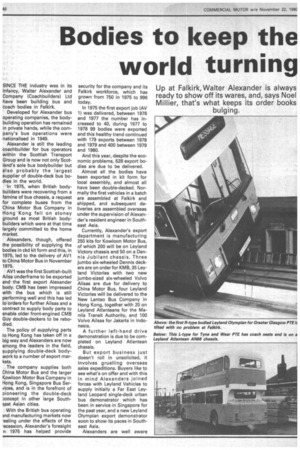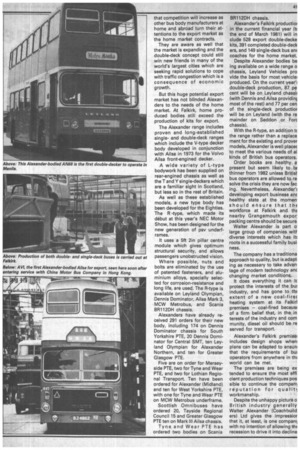Bodies to keep the world turning
Page 42

Page 43

If you've noticed an error in this article please click here to report it so we can fix it.
Up at Falkirk,Walter Alexander is always ready to show off its wares, and, says Noel Millier, that's what keeps its order books bulging.
SINCE THE industry was in its infancy, Walter Alexander and Company (Coachbuilders) Ltd have been building bus and coach bodies in Falkirk.
Developed for Alexander bus operating companies, the bodybuilding operation has remained in private hands, while the company's bus operations were nationalised in 1949.
Alexander is still the leading coachbuilder for bus operators within the Scottish Transport Group and is now not only Scotland's sole bus bodybuilder but also probably the largest supplier of double-deck bus bodies in the world.
In 1975, when British bodybuilders were recovering from a famine of bus chassis, a request for complete buses from the China Motor Bus Company in Hong Kong fell on stoney ground as most British bodybuilders which were at that time largely committed to the home market.
Alexanders, though, offered the possibility of supplying the bodies in ckd kit form and this, in 1975, led to the delivery of AV1 to China Motor Bus in November 1975.
AV1 was the first Scottish-built AiIse underframe to be exported and the first export Alexander body. CMB has been impressed with the bus which is still performing well and this has led to orders for further Ailsas and a contract to supply body parts to enable older front-engined CMB Guy double-deckers to be rebodied.
The policy of supplying parts to Hong Kong has taken off in a big way and Alexanders are now among the leaders in the field, supplying double-deck bodywork to a number of export markets.
The company supplies both China Motor Bus and the larger Kowloon Motor Bus Company in Hong Kong, Singapore Bus Services, and is in the forefront of pioneering the double-deck poncept in other large Southaast Asian cities.
With the British bus operating Ind manufacturing markets now -eeling under the effects of the -ecession, Alexander's foresight n 1975 has helped provide
security for the company and its Falkirk workforce, which has grown from 750 in 1975 to 996 today.
In 1975 the first export job (AV 1) was delivered, between 1976 and 1977 the number has increased to 40, during 1977 to 1978 99 bodies were exported and this healthy trend continued with 179 exports between 1978 and 1979 and 400 between 1979 and 1980.
And this year, despite the economic problems, 528 export bodies are due to be delivered.
Almost all the bodies have been exported in kit form for local assembly, and almost all have been double-decked. Normally the first vehicles in a batch are assembled at Falkirk and shipped, and subsequent deliveries are assembled overseas under the supervision of Alexander's resident engineer in Southeast Asia.
Currently, Alexander's export department is manufacturing 250 kits for Kowloon Motor Bus, of which 200 will be on Leyland Victory chassis and 50 on a Dennis Jubilant chassis. Three jumbo six-wheeled Dennis deckers are on order for KMB, 35 Leyland Victories with two new jumbo-sized six-wheeled Volvo Ailsas are due for delivery to China Motor Bus, four Leyland Victories will be delivered to the New Lantao Bus Company in Hong Kong, together with 20 on Leyland Atlanteans for the Manila Transit Authority, and 100 Volvo Ailsas for Jakarta in Indonesia.
A further left-hand drive demonstration is due to be completed on Leyland Atlantean chassis.
But export business just doesn't roll in unsolicited, it involves gruelling overseas sales expeditions. Buyers like to see what's on offer and with this in mind Alexanders joined forces with Leyland Vehicles to supply initially a Far East Leyland Leopard single-deck urban bus demonstrator which has been in service in Singapore for the past year, and a new Leyland Olympian export demonstrator soon to show its paces in Southeast Asia.
Alexanders are well aware that competition will increase as other bus body manufacturers at home and abroad turn their attentions to the export market as the home market contracts.
They are aware as well that the market is expanding and the double-deck concept could still win new friends in many of the world's largest cities which are seeking rapid solutions to cope with traffic congestion which is a consequence of economic growth.
But this huge potential export market has not blinded Alexan ders to the needs of the home market. At Falkirk, home produced bodies still exceed the production of kits for export.
The Alexander range includes proven and long-established singleand double-deck ranges which include the V-type decker body developed in conjunction with Ailsa in 1973 for the Volvo Ailsa front-engined decker.
A wide variety of L-type bodywork has been supplied on rear-engined chassis as well as the T and Y single-deckers which are a familiar sight in Scotland, but less so in the rest of Britain.
As well as these established models, a new type body has been developed for the Eighties.
The R -type, which made its debut at this year's NEC Motor Show, has been designed for the new generation of psv underframes, It uses a bit 2in pillar centre module which gives optimum structural security, and allows passengers unobstructed vision. Where possible, nuts and bolts are eliminated by the use of patented fasteners, and alu
minium alloys, specially selected for corrosion-resistance and
long life, are used. The R-type is available on Leyland Olympian, Dennis Dominator, Ailsa Mark 3, IVICW Metrobus, and Scania BR112DH chassis.
Alexanders have already received 291 orders for their new body, including 174 on Dennis Dominator chassis for South Yorkshire PTE, 20 Dennis Domi nator for Central SMT, ten Leyland Olympian for Alexander Northern, and ten for Greater Glasgow PTE.
Five are on order for Merseyside PTE, two for Tyne and Wear PTE, and two for Lothian Regio nal Transport. Ten have been ordered for Alexander (Midland) and ten for West Yorkshire PTE, with one for Tyne and Wear PTE on MCW Metrobus underframe. Scottish Omnibuses have ordered 20, Tayside Regional Council 15 and Greater Glasgow PTE ten on Mark Ill Ailsa chassis. Tyne. and Wear PTE has ordered two bodies on Scania BR112DH chassis.
Alexander's Falkirk productior in the current financial year (tc the end of March 1981) will in dude 528 export double-decke kits, 391 completed double-deck ers, and 149 single-deck bus an coaches for the home market.
Despite Alexander bodies be ing available on a wide range o chassis, Leyland Vehicles pro vide the basis for most vehicle: produced. On the current year': double-deck production, 87 pe cent will be on Leyland chassi: (with Dennis and Ailsa providinc most of the rest) and 77 per cen of the single-deck productior will be on Leyland (with the re mainder on Seddon or Fort chassis).
With the R-type, an addition tt the range rather than a replace ment for the existing and prover models, Alexander is well placet to meet the various needs of al kinds of British bus operators.
Order books are healthy a present but seem likely to be thinner from 1982 unless British bus operators are allowed to re solve the crisis they are now fee ing. Nevertheless, Alexander'e developing export business ant healthy state at the momen. should ensure that the workforce at Falkirk and the nearby Grangemouth expor packing centre should be secure.
Walter Alexander is part o. large group of companies with diverse interests which has it roots in a successful family busi. ness.
The company has a traditiona approach to quality, but is adapt ing as necessary to take advan tage of modern technology anc changing market conditions.
It does everything it can tt protect the interests of the bu: industry, and has gone to thE extent of a new coal-firet heating system at its Falkirl premises — coal-fired becaus( of a firm belief that, in the in terests of the industry and corn munity, diesel oil should be re served for transport.
• Alexander's Falkirk premise: includes design shops wherE plans can be adapted to ensurt that the requirements of bu: operators from anywhere in thE world can be met.
The premises are being ex tended to ensure the most effi cient production techniques pos sible to continue the compan) reputation for qualit) workmanship.
Despite the unhappy picture o British industry generally Walter Alexander (Coachhuild ers) Ltd gives the impressior that it, at least, is one compel]) with no intention of allowing the recession to drive it into decline














































































































